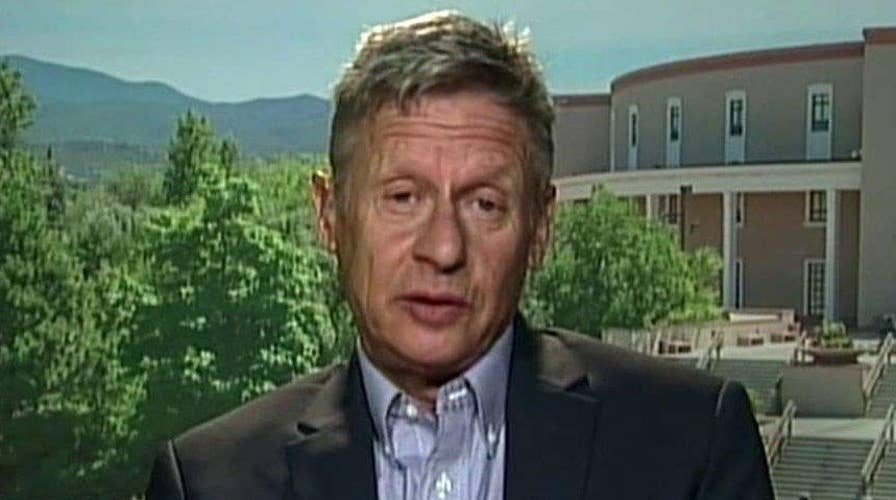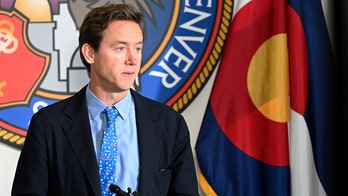Libertarian Gary Johnson makes his case for the White House
2016 candidate weighs in on how he can play spoiler in the two party race
In a confounding election season where voters hold deep reservations about the likely Republican and Democratic nominees, the third-party Libertarian ticket has a rare chance this year to be more than a footnote in the presidential race.
And that chance – to absorb disaffected voters who have little interest in picking ‘Trump’ or ‘Clinton’ this November – is raising the stakes for the national convention starting Friday where activists with the oft-sidelined movement will choose their nominee.
“There is a huge opportunity in this election cycle,” Libertarian Party Chairman Nicholas Sarwark told FoxNews.com.
Former New Mexico Gov. Gary Johnson, heavily favored to win the Libertarian nomination, has been enjoying the spotlight lately as at least two recent polls have put him in double digits in a three-way race against Democrat Hillary Clinton and Republican Donald Trump. One Fox News poll showed Johnson pulling 10 percent against the two titans – not exactly in contention, but nevertheless impressive for a party that’s never garnered more than 1 percent of the vote in a presidential election.
Whether Johnson’s numbers reflect growth among libertarians or simply a none-of-the-above choice, the candidate acknowledged in an interview with FoxNews.com, “It’s a combination of both.”
But, presuming he can snag the nod at the Memorial Day weekend convention, which starts Friday and wraps up Monday in Orlando, Johnson indicated he’ll happily fill the role of Trump/Clinton alternative at a time when some voters are seeking out a third-party option. Delegates will nominate a candidate Sunday.
“The nominee for the Libertarian Party is going to be the only third party candidate on the ballot in all 50 states,” he said. “I jokingly say that if Mickey Mouse were [the] third name in any polls, the recognizable figure that he is, [he] would be at 30 percent. But Mickey is not on the ballot in all 50 states.”
While prominent conservatives have floated the idea of a new third party, state ballot access will indeed be a challenge. As Johnson says, the Libertarian Party – already on 32 state ballots – will likely be on all 50 state ballots by November.
Upping his potential appeal to #NeverTrump Republicans, Johnson tapped another former GOP governor, William Weld of Massachusetts, to be his running mate, both fiscal conservatives and social liberals.
“If conservative means smaller government, I think we are the proven commodity,” Johnson said.
He is still short of the needed 15 percent to qualify for the presidential debates. But he believes if he’s in the debates, the ticket could collect electoral votes.
“I would not be doing this if there wasn’t the opportunity to actually win,” Johnson said. “New Mexico, Utah, Wyoming, Alaska, there are some real opportunities.”
The 15 percent debate threshold may be reachable. His standing in the Fox News poll was consistent with a Monmouth University poll in March that showed him at 11 percent. If the numbers hold, Johnson would far exceed third-party candidate Ralph Nader’s 3 percent in 2000, but still lag behind Ross Perot’s 19 percent in 1992.
Johnson’s optimism about actually winning is tempered by reality and history. Not only does the party have a poor track record in general elections, but Johnson’s poll numbers haven’t always held up either. In the 2012 general election – when Johnson initially ran as a Republican and later as a Libertarian -- he polled at about 4 percent during the campaign but ended up getting less than 1 percent of the popular vote.
Still, the 1.2 million votes represented a record for a Libertarian, and if the party can build on that this year, it could be enough to at least influence the outcome in November – though whether the candidate draws votes away from the GOP or Democratic nominee remains to be seen.
Sarwark suggested they’ll pull from both sides.
“A group of Republicans feel their party’s nomination was stolen from them by a reality TV star. A group of Democrats that supported Bernie Sanders don’t want to support a war hawk, who supports the racist war on drugs and has been a corporate shill,” he said.
Last week, Weld made waves by comparing Trump’s deportation policy to Nazi tactics. But Johnson said they were not holding back on Clinton either, and are reaching out to disaffected Sanders supporters.
“I don’t think there is any question that if Hillary is elected, government is going to expand. With regard to military and foreign policy, she has been an architect,” Johnson said. “Is anything going to change with regards to foreign policy? No.”
There could still be some drama this weekend.
About 1,000 delegates are expected to gather in Orlando. The top contenders are Johnson, anti-virus software developer John McAfee and libertarian media publisher Austin Petersen, and 15 other candidates.
“If Johnson does not win on the first round, it will be mine,” McAfee told FoxNews.com in an email.
Johnson likely isn’t guaranteed a first ballot victory, said William Irwin, the chairman of the philosophy department at King’s College, who has written books on libertarianism, most recently “Free Dakota.”
“Some predicted the libertarian moment has passed. I think the libertarian moment is now,” Irwin told FoxNews.com. “But just like there are Never-Trump and Never-Hillary voters, there are some libertarians who are Never-Johnson. He was sort of an accidental Libertarian who came to the party after he couldn’t get into the [2012] Republican primary debates.”
Johnson, if nominated, could run into trouble with some conservatives – yet attract liberals – as a supporter of abortion rights and marijuana legalization. He also favors military cuts and a reserved foreign policy, while backing sweeping entitlement reforms, changes to the tax code and term limits for members of Congress.
Johnson and Weld, both two-term governors in the 1990s, were given A’s in the libertarian Cato Institute’s Fiscal Policy Report Card for cutting spending and taxes.
“Two governors running against a candidate that has never held office and another who has not held executive office -- the Libertarians would be the most experienced ticket,” Cato Institute Executive Vice President David Boaz told FoxNews.com.
He added, “But this year, experience isn’t what people are looking for.”





